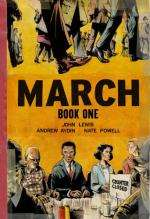|
This section contains 590 words (approx. 2 pages at 400 words per page) |

|
March: Book One Summary & Study Guide Description
March: Book One Summary & Study Guide includes comprehensive information and analysis to help you understand the book. This study guide contains the following sections:
This detailed literature summary also contains Topics for Discussion on March: Book One by Andrew Aydin , John Lewis, and Nate Powell.
Lewis, John; Aydin, Andrew. March, Book One; Top Shelf Productions, Marietta, Georgia, 2013. Kindle AZW file.
The book is presented in the form of a graphic memoir of John Lewis's life. The traditional graphic book frames depict the various aspects of Lewis's early life and his early role in the Civil Rights Movement, set against his role in 2009 as a Congressman when Barack Obama was about to be sworn in as the United States President.
Lewis grows up on a farm with conservative parents. One of his jobs is to tend the chickens. Imagining that he might grow up to be a minister, he practices preaching to the birds under his care. He feels compassion for the chickens and buries all the birds that die, including the babies. He learns to manipulate the setting hens to get the most from them, but also learns that it is possible to overextend the hens. He is always upset when the family eats one of the chickens for a special dinner.
When Lewis is a teenager, he spends time with a relative in Ohio. There, he discovers that he does not mind eating chicken when he has not played a part in raising it. He also begins to realize there are other ideas about the major issues of life.
As a youngster, Lewis is serious about his education. His family sometimes needs him to stay home and work on the farm, but Lewis often hides and manages to catch the bus to school. At the end of the day, his father scolds him but seems to know that Lewis will take the same action again the next time he has the opportunity. Lewis notices that the white children have better buses and better school facilities. When the courts rule that “separate but equal” is no longer acceptable, Lewis expects to see changes. He applies to a college that has traditionally been white, but the school officials do not respond.
Leaders in the black community, including Marin Luther King, Jr., offer to help Lewis sue the state of Alabama for admission to the college. They promise to raise the money for the lawsuit, but Lewis's family refuses to support him and he drops the idea. However, as a college student, he joins a group of protestors who begin a program aimed at forcing the local department stores to serve blacks at their lunch counters. They are beaten, arrested, and threatened, but they continue to work their program. Over the coming weeks, officials make and break promises, and make threats in the hope that the protests will stop. The protestors never waver and even manage to get a boycott on several downtown businesses that refuse to serve blacks at their lunch counters.
When someone throws dynamite into the home of Z. Alexander Looby, the attorney who represents the protestors after the first round of arrests, the protestors march on Nashville City Hall where they confront Mayor Ben West. West has a progressive outlook and, facing pressure from thousands of protestors, urges the downtown businesses to stop their segregation policies. The following day, blacks eat at the lunch counter for the first time and Martin Luther King, Jr. speaks in Nashville. He says the protestors have inspired him, but reminds them that they will have to be wiling to keep fighting for their rights. While blacks are being served at the lunch counters, two black men enter a small hamburger restaurant and face angry white workers, all while hearing King's words echo in their minds.
Read more from the Study Guide
|
This section contains 590 words (approx. 2 pages at 400 words per page) |

|



